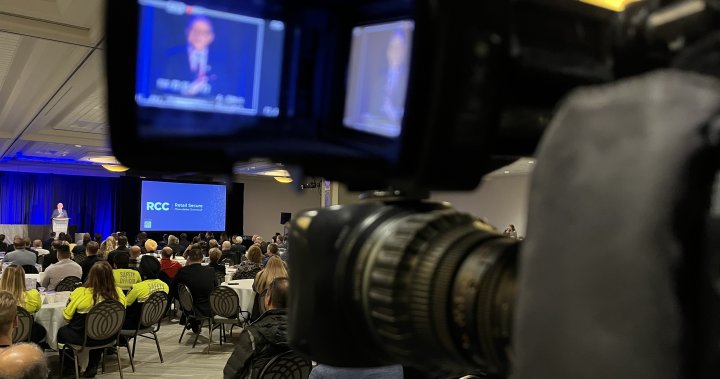Violent and retail crime continues to be a persistent conversation among leaders and stakeholders in Manitoba.
On Friday, a Retail Secure Manitoba Summit was held in downtown Winnipeg with delegations from all over the province to address it.
“This is an opportunity to bring together all of the missing pieces that are doing great work individually,” said John Graham, the director of prairie government relations for the Retail Council of Canada.
“We really need a community-wide solution to the issues that are facing us all.”
Those issues have been described as deeply complex and intersectional, including mental health, poverty and addiction.
However, business owners like Tom De Nardi say it’s time to take conversations beyond the root causes.
“I have heard a lot of, ‘We all know what the problem is,’ but very short on ‘What are we going to do about it,’” De Nardi said. “I think it’s going to take some real leadership from all levels of government… in order to change laws.”
He added his family’s business, Piazza De Nardi, deals with about one incident per week.
“Whether that means that we have to physically encounter them, engage them, or whether we’ll try to do more preventative action from stopping a person following them around the store, letting them know that we know they’re in the store (and) we’ve seen them before, that sort of thing.”
He said some of these instances involve repeat offenders who aren’t necessarily malicious, but in need.

Get breaking National news
For news impacting Canada and around the world, sign up for breaking news alerts delivered directly to you when they happen.
“They don’t have the money to get alcohol (or) they feel that they need to take something to eat, or because they’re taking something and they’re going to resell it for something else,” De Nardi said.
As such, while Winnipeg’s lauded Violent Crime and Retail Theft initiative helps in the short term, it’s not considered sustainable.
“It’s a costly approach as a Band-Aid solution to issues that would need a more holistic approach,” Graham said. “We need to improve proactive strategies for retailers, but we also need to make sure that we’re getting police to respond when we should respond on the incidents… and look at alternative responses for those who are less criminal and less violent.”
Former Chief Justice of the Provincial Court of Manitoba, Raymond Wyant, was a speaker at the summit and asserted that slowing crime is not as easy as hastening arrest numbers.
“A lot of the people who are in jail have diagnosed for undiagnosed mental illnesses. The studies clearly show that. And people with mental illnesses don’t get better in jail,” he said.
Wyant said many released from jail face the same challenges that put them into it — like addiction and poverty — and can’t access proper resourcing, resulting in a cycle of crime.
But he also said that doesn’t mean criminals shouldn’t be put away.
“People need to be locked up in order to separate to protect society, in order to send appropriate messages to society that certain types of behavior can’t be tolerated. And that’s part of the public confidence issue and part of the responsibility of courts. But we can’t arrest everyone,” he said.
De Nardi noted that it seems like a lack of consequences for criminals is contributing to the corrosion of business and safety in the province.
“We think we might be kind of by not doing something. But the effect it has tenfold on the rest of society is incalculable,” he said. “There has to be consequences.”
Premier Wab Kinew, who was also at the summit, said his government is listening.
“A big chunk of what we need is around the administration of justice. But the huge, huge difference to make communities safer is going to come from investing in mental health and health care and feeding kids in schools,” he said.
© 2024 Global News, a division of Corus Entertainment Inc.


